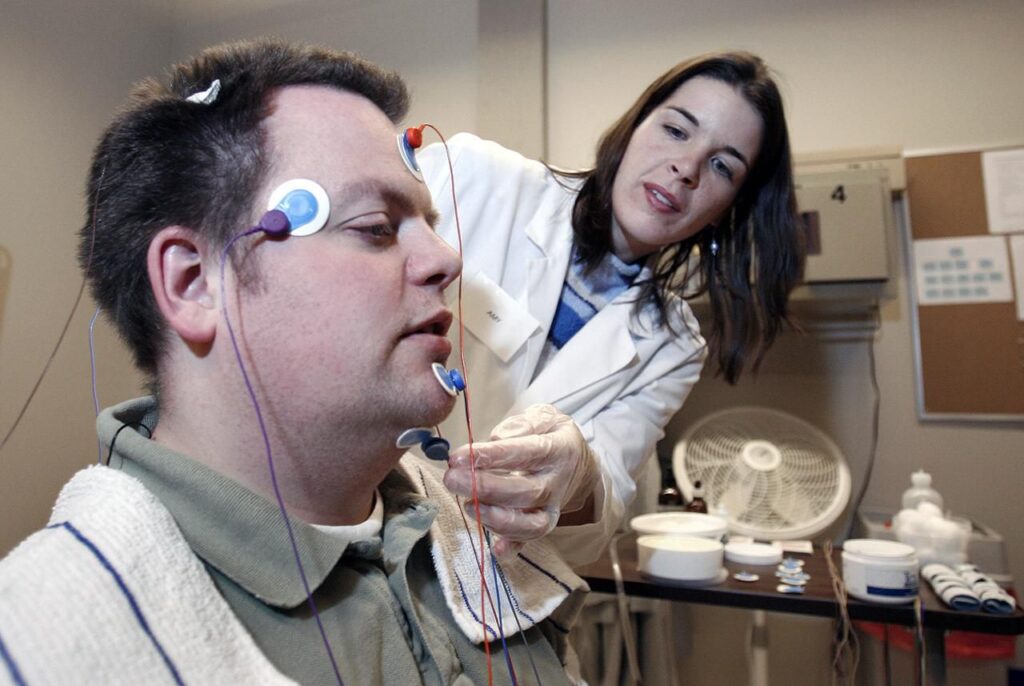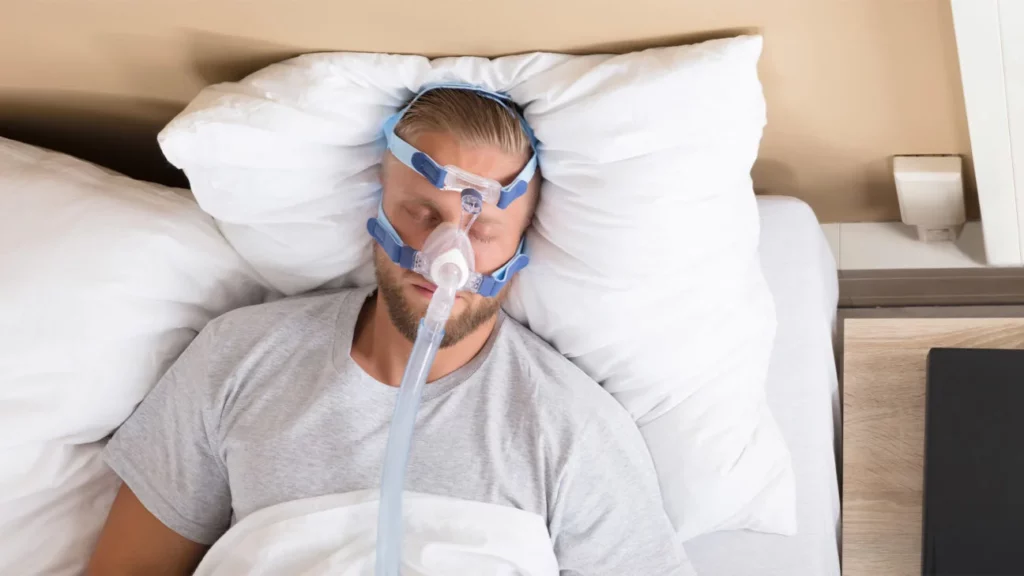Do you often find yourself waking up feeling tired and groggy, despite getting a full night’s sleep? You’re not alone. Many people struggle with poor sleep quality, which can negatively impact their overall health and well-being. Fortunately, there is a solution – a sleep test. In this article, we will explore the importance of sleep quality, the basics of a sleep test, how it works, and how it can help improve your sleep quality.
Understanding the Importance of Sleep Quality
It’s no secret that sleep plays a crucial role in our overall health. Quality sleep is essential for repair and rejuvenation, both physically and mentally. When we sleep, our bodies go through various stages of sleep, including the important REM (rapid eye movement) stage, which is associated with dreaming and helps with memory consolidation, learning, and mood regulation.
During a sleep test, you will be comfortably settled in a private room designed to resemble a bedroom to promote a natural sleep environment. The sensors and electrodes attached to your body are painless and non-invasive, ensuring that you can sleep without discomfort. The data collected throughout the night is meticulously analyzed by sleep technologists and physicians to provide a detailed report on your sleep patterns and any abnormalities detected.
Research has shown that poor sleep quality can lead to a myriad of health issues, including obesity, heart disease, diabetes, and even mental health disorders such as depression and anxiety. It’s not only the quantity of sleep that matters but also the quality.
The Connection Between Sleep and Health
There is a strong association between sleep and our overall health. When we consistently experience poor sleep quality, it can have a detrimental impact on various aspects of our well-being. Lack of quality sleep can weaken our immune system, making us more susceptible to illnesses and infections. It can also affect our cognitive function, leading to difficulties with concentration, memory, and decision-making.
Furthermore, poor sleep quality can affect our mood and emotional well-being. It’s not uncommon to feel irritable, moody, or more prone to stress when we are not getting enough restorative sleep. Sleep deprivation has even been linked to an increased risk of accidents and injuries due to impaired judgment and slower reaction times.

Why Quality Sleep Matters
Poor sleep quality doesn’t just leave us feeling tired and unrefreshed. It can have serious long-term consequences for our health and quality of life. This is why it’s crucial to address any sleep issues you may be experiencing and strive for better sleep quality.
One interesting aspect of sleep quality is its impact on our creativity. Studies have shown that a good night’s sleep can enhance our creative thinking and problem-solving abilities. During sleep, our brains consolidate information and make connections that might not have been apparent while we were awake. This is why sometimes we wake up with a fresh perspective or a solution to a problem that seemed unsolvable the day before.
Another fascinating area of research is the relationship between sleep quality and aging. Poor sleep quality has been associated with accelerated aging, both in terms of physical appearance and cognitive decline. When we consistently experience disrupted sleep or insufficient sleep, our bodies release stress hormones that can contribute to premature aging. Additionally, lack of quality sleep has been linked to an increased risk of developing age-related conditions such as dementia and Alzheimer’s disease.
The Basics of a Sleep Test
If you suspect that your sleep quality is compromised, a sleep test may be recommended by your healthcare provider. So, what exactly is a sleep test?
A sleep test, also known as a polysomnogram, is a diagnostic tool used to monitor and evaluate various aspects of your sleep. It involves spending a night in a sleep lab while sensors and electrodes are attached to your body to record data such as brain activity, eye movements, heart rate, and oxygen levels. This comprehensive evaluation allows sleep specialists to assess any potential sleep disorders and identify the root causes of poor sleep quality.
To learn more about sleep apnea test click here.
Different Types of Sleep Tests
There are different types of sleep tests available, depending on your specific needs and concerns. The most common type is an overnight, in-lab sleep test where you sleep at a specialized sleep center under the supervision of trained medical professionals. This setting allows for real-time monitoring and immediate intervention if necessary. Alternatively, there are also home sleep tests, which use simplified devices to collect data while you sleep in the comfort of your own bed.
Home sleep tests are particularly convenient for individuals who prefer the familiarity of their own bedroom and bed. These tests typically involve wearing a portable monitoring device that records key sleep metrics such as breathing patterns and oxygen levels. While home sleep tests may not capture as much data as in-lab tests, they can still provide valuable insights into your sleep quality and help identify potential issues that require further evaluation by a sleep specialist.
How a Sleep Test Works
Now that we have a basic understanding of what a sleep test is, let’s delve into how it works.
When you arrive at the sleep lab, the sleep technician will prepare you for the test by attaching sensors and electrodes to your body. These sensors are painless and non-invasive, and they will record different aspects of your sleep throughout the night. The sleep technician will also explain the process and answer any questions you may have before you settle in for the night’s sleep. Find more about sensors at http://www.columbia.edu/~st2839/final.html
Once you are comfortable and ready to sleep, the sleep technician will start the monitoring process. They will continuously monitor your sleep and collect data on various parameters such as brain activity, eye movements, muscle tone, heart rate, and breathing patterns. All this information will provide valuable insights into your sleep patterns and help identify any potential sleep disorders or issues affecting your sleep quality.
But what exactly do these sensors and electrodes do? Let’s take a closer look. The sensors placed on your scalp, known as electroencephalogram (EEG) sensors, measure your brain activity during sleep. They can detect different stages of sleep, such as deep sleep and rapid eye movement (REM) sleep, which are crucial for your overall sleep quality. Additionally, sensors placed near your eyes, known as electrooculogram (EOG) sensors, track your eye movements, helping to identify when you enter REM sleep. This information is essential for diagnosing sleep disorders like sleep apnea and narcolepsy.
Furthermore, the sleep technician will attach sensors to your chest and abdomen to monitor your breathing patterns and muscle tone. These sensors, called respiratory effort belts, can detect any irregularities in your breathing, such as pauses or shallow breaths, which may indicate sleep apnea. Additionally, sensors placed on your legs can measure muscle activity and identify any restless leg movements that may disrupt your sleep.
Interpreting Sleep Test Results
After the sleep test, the collected data will be analyzed by sleep specialists who will interpret the results. They will look for abnormalities and patterns that can indicate sleep disorders or issues impacting your sleep quality. Based on these findings, they will provide a comprehensive report and recommendations for improving your sleep quality.
The interpretation of sleep test results requires expertise and knowledge in sleep medicine, which is why it’s essential to consult a sleep specialist to accurately assess and evaluate your sleep patterns.
During the analysis, sleep specialists will examine the data collected from the sensors and electrodes in detail. They will look for specific patterns in brain activity, eye movements, and muscle tone that may suggest sleep disorders such as insomnia, sleep apnea, or restless leg syndrome. They will also assess the duration and quality of each sleep stage, including the amount of time spent in deep sleep and REM sleep.
Additionally, sleep specialists may compare your sleep test results to normative data to determine how your sleep patterns compare to those of the general population. This comparison can provide valuable insights into whether your sleep quality is within a healthy range or if there are any significant deviations that require further investigation.
Improving Sleep Quality with Sleep Test Insights
Once you have received the results of your sleep test, you can use the insights gained to make positive changes and improve your sleep quality.
Understanding the intricacies of your sleep patterns can be a game-changer in achieving restful nights and energized days. The data from your sleep test unveils a wealth of information, offering a glimpse into the mysterious realm of your nightly rest. From the detection of potential sleep disorders to the analysis of sleep stages and interruptions, each detail plays a crucial role in deciphering the quality of your slumber.
Tailoring Sleep Habits Based on Test Results
The sleep test results can shed light on various aspects of your sleep, such as the presence of sleep disorders, the quality of sleep stages, and any disruptions during the night. Armed with this information, you can work with your healthcare provider to develop a tailored plan to address any identified sleep issues.
Embarking on a journey towards enhanced sleep quality involves a personalized approach crafted specifically for you. Collaborating with your healthcare team, you can delve into the realm of sleep hygiene practices, fine-tuning your bedtime rituals to pave the way for a serene slumber. Establishing a consistent sleep schedule, curating a tranquil sleep environment, embracing relaxation techniques before bedtime, and steering clear of sleep-disrupting stimulants form the cornerstone of your customized sleep improvement plan. Click here to find more about relaxation.
Medical Interventions for Sleep Improvement
In some cases, the sleep test results may indicate the need for medical interventions to improve sleep quality. Depending on the diagnosis, treatment options may include medication, therapy, or the use of sleep devices, such as continuous positive airway pressure (CPAP) machines for sleep apnea. These interventions are designed to address the root causes of sleep disturbances and promote better sleep quality.
Delving deeper into the realm of medical interventions unveils a spectrum of possibilities aimed at optimizing your sleep architecture. From pharmacological aids tailored to specific sleep disorders to therapeutic interventions unraveling the complexities of your mind’s nocturnal wanderings, each approach is meticulously designed to restore the balance of restorative sleep. Embracing technological marvels like CPAP machines heralds a new dawn in combating sleep apnea, ensuring uninterrupted rest and revitalization.

Frequently Asked Questions About Sleep Tests
For those considering a sleep test, it is natural to have questions. Here are some commonly asked questions and their answers:
Preparing for a Sleep Test
Prior to a sleep test, it is important to follow any instructions provided by your healthcare provider or sleep clinic. This may include avoiding certain medications or alcohol, ensuring you arrive at the sleep lab at the recommended time, and packing comfortable sleepwear and toiletries for your overnight stay.
What to Expect After a Sleep Test
After the sleep test, you can expect to have a follow-up appointment with your sleep specialist to discuss the results and recommendations. They will explain the findings and provide guidance on how to improve your sleep quality based on the test results.
If a sleep disorder is identified, further treatment options will be discussed, and a plan will be developed to address the specific issues affecting your sleep.In conclusion, a sleep test is a valuable tool for identifying and addressing sleep issues that may be compromising your sleep quality. By understanding the importance of sleep quality, undergoing a sleep test, and utilizing the insights gained, you can take proactive steps towards improving your sleep and overall well-being. Don’t underestimate the power of a good night’s sleep – it can truly transform your life.

